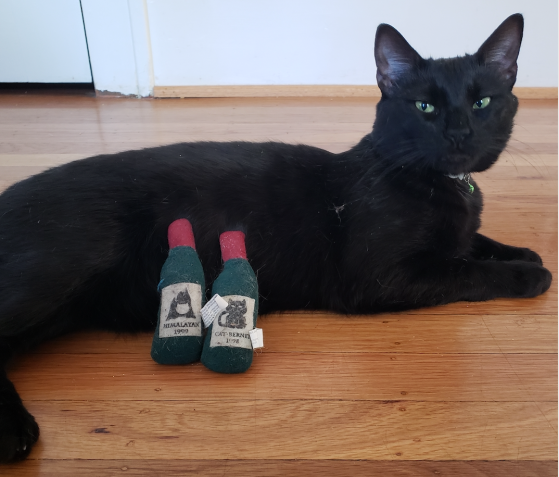“After all, I have antibodies and a dog named Fossie.”
So says Los Angeles-based attorney Carrie Mellon she chose to look back on the eight months she spent trying to adopt a rescue dog in 2020 — a time period during which she not only lost her second dog in less than a year, but also survived COVID. 19.
Named after Dr. Anthony Fauci because he “wears a white coat and was abandoned during the coronavirus,” Fauci the dog is one of about 3.2 million Shelter animals that American Society for the Prevention of Cruelty to Animals (ASPCA) Estimates are approved every year. This year, demand for animal adoptions has skyrocketed: With stay-at-home orders issued across the United States in March in response to the coronavirus pandemic, the ASPCA shared that according to industry data from BitpointAnimal welfare organizations across the country saw a significant spike in adoptions during the second half of March, with the estimated national adoption rate at 58% at the beginning of the month, jumping to 85% by the end of the month.
“We have seen an incredibly emotional response from people willing to open their homes to foster and adopt vulnerable shelter animals during this time of uncertainty and applaud them for heroically stepping up to help animals in need,” says Matt Bershaker, President and CEO of the ASPCA. “This unprecedented compassionate response from communities across the country in support of their local shelters reflects widespread appreciation for the invaluable role pets play in our lives.”
Despite concerns that stay-at-home orders will flood shelters with animals due to an increase in the number of abandoned pets, officials from rescue organizations like Chicago Animal Care and Control (CAdministrative Coordination Committee) and Society for the Prevention of Cruelty to Animals Los Angeles (spcaLA) He says the opposite was true.
“When stay-at-home orders went into effect, we were concerned about the possibility of seeing an increase in admissions and a decrease in transfers and adoptions,” says Jennifer Schlueter, public information officer for CACC. “We were very pleased to experience the exact opposite of what we initially feared…the demand for foster and adoptive animals combined with the reduced intake kept our numbers down to about 30 animals for a period of time in the late spring and early summer.”
In Los Angeles, Madeline Bernstein, president of spcaLA, says the shelter adopts out pets as quickly as they come. “This is true across the country,” she says. “Animal shelters have been emptied of animals that could be adopted either through adoption or fostering, because of the time, when families are home together during lockdown, to work with a new pet. It is also a hedge against loneliness.
It’s a trend that doesn’t surprise longtime pet owners like Caitlin McCarthy, who understands firsthand how comforting animals can be, especially in times of stress or isolation. After her dog, a Westie named Oscar, died in September, McCarthy, a teacher in Worcester Public Schools in Massachusetts, says she wasn’t able to last long without her fur baby.
“This pandemic has been a very isolating situation,” she says. “I was grateful to spend time with Oscar because his health started to deteriorate when the schools closed, so I was able to be with him. But after he died I noticed he wasn’t home because he was a family member. I work from home. I won’t go out. I really missed having a dog.” .
So when she saw it Northern New England Westie Rescue Inc. She shared some photos on Facebook of a few dogs that were up for adoption, so I jumped at the chance. “I messaged them right away,” she says. “It wasn’t even something I thought about. I just did it. Because I knew. I saw the little faces and knew one of them had to be mine.”
About a week later, McCarthy was meeting a volunteer driver in the Olive Garden parking lot to pick up Finbar, a 10-year-old Westie rescued from a “puppy mill” in Kansas. As soon as she hugged him, she said she knew they had a connection.
“I was drawn towards that image of him [the rescue] Posted on Facebook. There was something very affectionate in his eyes. So I told them I would be happy with any dog, but if I could meet him, I think he’s the dog for me. “I went to pick him up and they opened the back of the car and there he was. I was so excited and he was shy, as you can imagine. But as soon as I picked him up, he licked me right on the cheek. It’s like he knew, like he was saying, ‘You’re going to be my girl;’ Isn’t it?” And the answer was yes.

Since arriving at his new home on October 26, Finbar (a name McCarthy says she chose because her late mother loved him) has blossomed before McCarthy’s eyes. “He’s been used as a dog mill for 10 years. His whole life was in a cage. He didn’t know what a game was. He never had a name. He’d never gone out to play. So I’m teaching him all this stuff,” she says. Big healing for me too. It’s like a furry proof of hope during a very disturbing time. When you see a dog who has survived the most horrific conditions and is getting better every day, how can you not feel hopeful about life in the future?
The emotional support that pets can provide to their owners is more important than ever at this moment, says Rachel Silverman, a psychologist who specializes in couple and family psychology and who often prescribes emotional support animals to patients. “With so much uncertainty and instability, animals provide people, especially children, with unconditional love, support and comfort, and they also serve as a distraction,” she says. “I had an 8-year-old patient who told me how she shared her adopted cat with her grandmother so that her grandmother would have a piece of her with her and she wouldn’t feel alone because she couldn’t visit.”
Staying home amid the pandemic has also motivated many first-time pet owners to make the decision to rescue and, in doing so, discover how emotionally capable animals are. Since adopting their dog, Nana, a 6-year-old boxer Badass Brooklyn Animal Rescue In April, Crystal Caiza and Peter Quandt discovered that she had an uncanny talent for lifting spirits.
“She’s a joy to have and she’s really in tune with how people are feeling. “I think everyone says this about their dog, but she’s definitely very aware when someone’s having a bad day,” Caiza says. “She’s really low energy and just wants to cuddle with people And hanging out. I think what we need most during this time is for me to be able to take a break from staring at screens and sit on the floor with my dog for a bit.

Of course, it’s not just dogs that provide much-needed moments of lightness. When Elise Healy and her partner realized they wouldn’t be able to take the trip to France they had planned in March to celebrate finishing university, they decided to adopt a new cat instead. They ended up rescuing Beau, a black shorthaired house from Seattle Area Cat Rescuewho helped them and their other cat, Keaton, deal with spending the year at home.
“[Poe’s] crazy. He loves being chased around the house and playing and will randomly jump into our laps and hang out with us. He often falls from the cat tower. “I don’t think I can adequately explain how brutal and hilarious it is,” Healy says. “It breaks the day to be sitting at your desk working and bored, and then, you know, all of a sudden you find a box moving around the house because he got in it and can’t get out.”

It looks like 2021 will be a big year for pets, too: In January, a shelter dog will reside in the White House for the first time ever when President-elect Joe Biden moves in with his dog Major, a German shepherd. Biden was adopted in 2018 from Delaware Humane Association (DHA). This will be a historic day for supporters of “Adopt, Don’t Shop,” a growing movement that encourages people to adopt pets from shelters and rescue groups rather than buy them from commercial breeders.
“Our staff and volunteers are so excited about Major going to the White House mainly because it highlights the important work we do to find great homes for dogs and cats. It’s as if one of our DHA adopters is good enough for the White House, he’s good Enough for your home, right? “And it’s not just DHA,” says Dubai Health Authority CEO Patrick Carroll. It highlights adoptions to all shelters in Delaware and across the country. I think having a shelter dog go to the White House will really help promote that awareness.
That Major and Biden’s other dog, Champ, heading to the White House would also mark the return of the time-honored tradition of presidential pets. “Americans are the majority of pet owners,” says Andrew Hager, a US-based historian. Presidential Pet Museum. “We kind of expect that from our presidents, and we get that mostly because presidents come from the American people and that’s part of our culture.”
The Bidens are It is said Plan to bring a cat with you, too. Perhaps they, like many other Americans, have been bitten by the pet adoption bug. Mellon, for example, says that even though it’s only been a few weeks since Fossie came home, his presence has made one thing clear to her: Despite the challenges she faced the first time around, she wants to rescue another dog — and soon. “The only thing I became absolutely sure of was that I was going to have another rescue,” she says. “I need a month to get good [Fauci]So we know each other well. Then I’ll get a second one.”